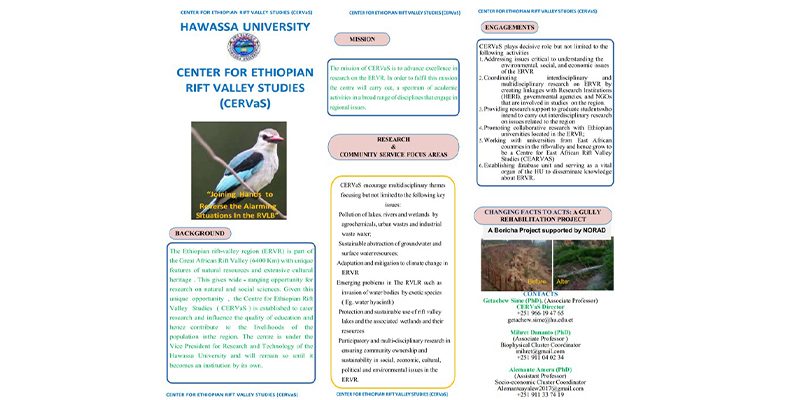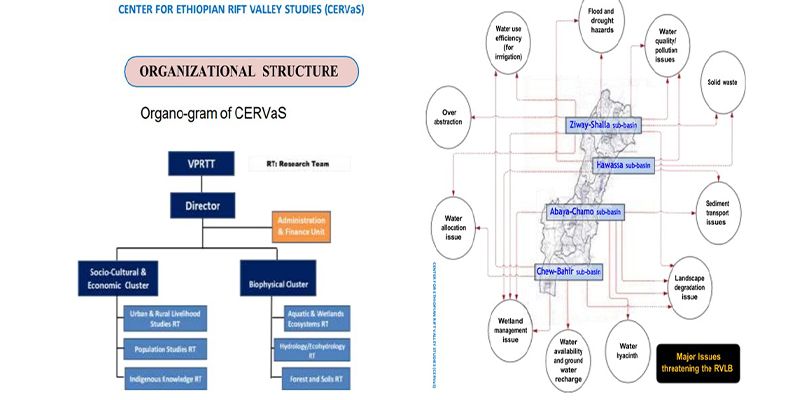Background About CERVaS
Ethiopian Rift-Valley Region (ERVR) is endowed with unique features of natural resources and extensive cultural heritage. The region offers a wide-ranging opportunity for research on natural and social sciences – particularly on the Ethiopian rift valley lakes and the indigenous culture. Given this unique opportunity, the center caters for interdisciplinary research and education at Hawassa University (HU), contributing to the livelihoods of the population in the region. Accordingly, the Center for Ethiopian Rift-valley Studies (CERVaS) was established in 2015. The Center is accountable to the Office of the Vice President for Research and Technology Transfer (VPRTT). The Center is at the inception is composed of staff from seven broad disciplines, but eventually, an affiliated staff in a wide variety of fields, including Natural resources and environmental studies, Agriculture, Engineering, Languages, Anthropology, History &Heritage, Health, Gender, etc. CERVaS staff have their home bases in different colleges/departments of the University including staff from other universities in the region. This strengthens the institutional and regional research capacity.
The mission of CERVaS is to advance excellence in research on the ERVR. In order to fulfill this mission the Center carrying out, by working closely with teaching and research units within and outside the HU, a spectrum of research activities in a broad range of disciplines that engage in regional issues. It is coordinating multidisciplinary research on ERVR by creating linkages with Higher Education and Research Institutions (HERIs), governmental agencies, and NGOs that are involved in studies on the region. The center also serves as a vital organ of the HU in disseminating knowledge about ERVR. Another essential function of the center is to promote research support to graduate students who intend to carry out interdisciplinary research on issues related to the region. When the Centre is fully established, it is the only National Resource Centre for the region located at Hawassa University. Therefore, it is foreseeable that the Centre is working with different offices of the region and plays a decisive role in addressing issues critical to understanding the environmental, social, and economic issues of the region. Through time, the center is also engaged in working with universities from East African countries in the rift valley and hence grows to be a Centre for East African Rift Valley Studies (CEARVaS).
Organizational structure
The research activities of CERVaS are organized in Clusters and Research Teams. A Cluster is a band of research teams grouped together based on the connection of the research areas that the groups focus on. Initially, the Centre started with two Clusters, namely Socio-Cultural & Economics and Biophysical Studies. A Research Team is the fundamental unit of the Center where a crew of researchers engaged in similar research themes forms a working work. The number of Clusters and Research Teams may be increased depending on the need that may arise.


The major activities of the center include
- Plan, implement, monitor and report the activities of the Center in agreement with the University’s Strategic Document and work towards its implementation;
- Lead the research activities of the center in accordance with the research strategy of the university;
- Initiate and strengthen national and international partnerships with academic and research institutions, regional and local government and non-government agencies, civil societies, etc.;
- Prepare and submit the institution’s plan and reports to the concerned bodies;
- Administer the human, material and financial resources of the Center,
- Oversee the recruitment, selection and employment of manpower in line with the approved organizational structure of the Center;
- Ensure the quality and ethical integrity of research activities conducted by the Center;
- Play a leading role in designing different strategies to obtain funds for the center;
- Design outlets for dissemination of the results of research, innovation and best practices;
- Strengthen the level of motivation and commitment of the staff;
- Ensure the integration of gender issues and the concerns of socially marginalized groups in planning research activities, consultancy and community services;
- Perform additional tasks given by the VPRTT.
Ongoing MSc students researches in the center
- The Impact of Climate Change on Groundwater Available Recharge of Lake Ziway Watershed, Ethiopia.
- Impact of Land Use/Land Cover Change and Climate Variability on Meki Sub-Watershed of Lake Ziway Watershed.
- The Combined Effects of Land Use/Land Cover Change and Climatic Variability on the Hydrological Responses of Ketar Sub-Watershed of Lake Ziway Watershed.
- Heavy metals and pesticides in soils and vegetables from irrigated farmlands at the vicinity of the Ethiopian Rift Valley Lakes (Lakes Ziway and Hawassa)
Ongoing research projects in the center
- Land use and land cover change and climate variability on water resources of lake Ziway watershed, central Rift valley lakes basin
- Agrochemical pollution & the associated risks with shoreline irrigation around lake Ziway, Ethiopia
- Addressing natural resources degradation through stakeholders' participation in the Ziway basin, central rift valley of Ethiopia
CERVaS Proceedings
Volume 1 Land use and Land cover Changes
Volume 2 Climate Changes Impacts Adaptation and Mitigation
Volume 3 Hydro Meteorology in the Ethiopian Rift Valley Region
Volume 4 Hydrogeology of the Ethiopian Rift Valley Region
Volume 5 Lake Water Pollution Status and Control Options in Rift
Volume 6 Lake and Wetland management in the rift valley Updated
Volume 7 Soil Erosion and Land Degradation of the Ethiopian Rift
Volume 8 Water Supply and Sanitation in the Ethiopian Rift Valley
Volume 9 Livelihoods of the Ethiopian Rift Valley Region
CERVaS Articles
Contact details:
